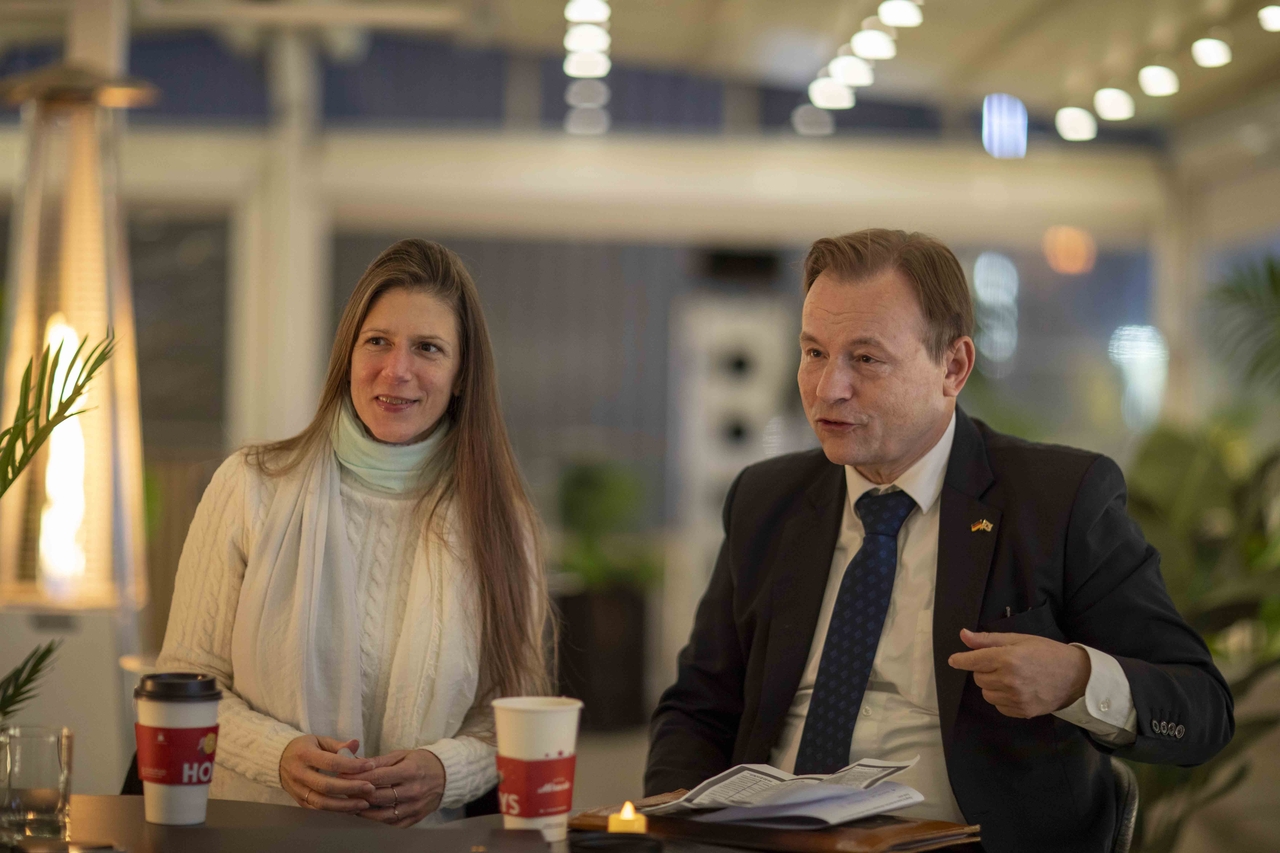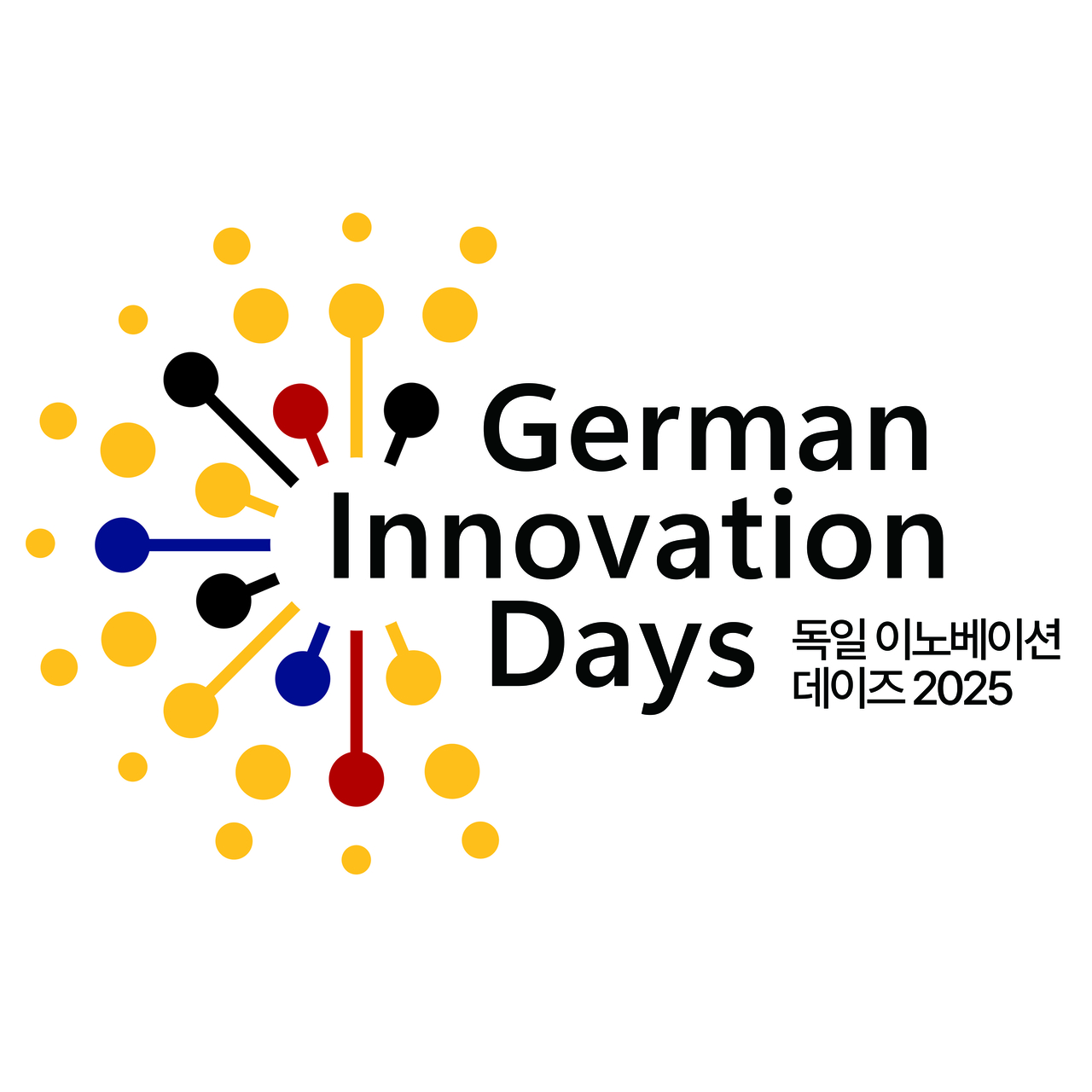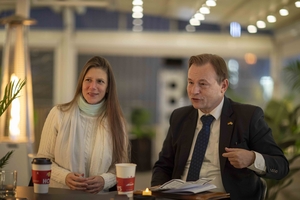 German Ambassador to Korea Georg Schmidt (right) and German AI expert Kinga Schumacher speak during an interview with The Korea Herald in Seoul on Wednesday. (Lee Jung-hwan, German Embassy Seoul)
German Ambassador to Korea Georg Schmidt (right) and German AI expert Kinga Schumacher speak during an interview with The Korea Herald in Seoul on Wednesday. (Lee Jung-hwan, German Embassy Seoul) As artificial intelligence continues to evolve at unprecedented speed, experts from Germany and Korea are urging democratic nations to deepen cooperation to ensure AI is developed in ways that uphold human dignity, civil liberties and the rule of law.
Speaking on the sidelines of the German Innovation Days — an initiative hosted by the Embassy of the Federal Republic of Germany in Seoul and The Korea Herald publisher Herald Media Group — German Ambassador to Korea Georg Schmidt and AI ethics expert Kinga Schumacher emphasized that innovation must remain firmly rooted in democratic accountability and shared values.
“We both profited very much from the way world trade was shaped. But this world order is being fundamentally challenged,” said Schmidt, referencing disruptions brought about by Russia’s invasion of Ukraine and rising US-China technology tensions.
Human-centered AI: Democratic imperative
A central theme of this year’s German Innovation Days is how countries like Germany and Korea — both technologically advanced democracies — can foster human-centered AI while preserving the principles that define open societies.
“Korea and Germany must and will protect the interests of the citizens,” the ambassador said. “So it should be AI, it should be human-centered.”
Schmidt noted differences in how the two nations publicly discuss AI. While Korea tends to emphasize the opportunities and economic potential of the technology, Germany focuses more on its societal risks — including misinformation, deepfakes and impacts on child development.
Schumacher, known for her work on inclusive AI, suggested that Germany’s tradition of user-centered, participative design could offer a valuable reference point for Korea’s fast-moving AI sector.
“Korea makes it possible to have fast growth in AI. While Korea might look deeper into how we are doing user-centered, participative design,” she said.
She emphasized the importance of involving stakeholders from the earliest design stages — a process that may initially slow development, but enhances long-term trust, usability and social impact.
Complementary strengths: Data, design, agility
While Germany and Korea differ in their approach to AI, the two countries bring complementary strengths that could power future cooperation.
“Korea has much more data than Germany. We might have a bit more experience with AI applications,” said Schumacher. “Putting those two together, everybody could benefit.”
Schmidt echoed this point, citing Korea’s openness to experimentation and rapid adoption of emerging technologies.
“There is a greater openness for new things in everyday life in this country. Maybe we need a bit of the Korean sense of like, hey, just try it. And maybe Korea needs a little bit of, ‘hey, be careful and check out what’s happening.’”
Germany’s AI ecosystem traditionally centers on industrial applications — such as smart manufacturing, robotics and precision engineering — while Korea leverages its strong digital infrastructure and vast data pools to drive consumer-facing innovations.
 (German Embassy Seoul)
(German Embassy Seoul) Designing AI for aging society
According to Statistics Korea, Korea is one of the fastest-aging societies among member nations of the Organization for Economic Cooperation and Development, with over 20 percent of its population expected to be aged 65 or older as of this year. In light of this demographic shift, the interviewees highlighted the role AI could play in supporting senior citizens.
“We definitely should have participative design and user-centered design to ensure that the services really benefit the elderly,” said Schumacher.
She added that AI should not replace human caregivers, but instead free up their time to provide meaningful emotional support. “Free up more time to talk to people who are too lonely,” she said.
Her remarks reflect growing global efforts to apply AI in elderly care — from voice assistants to personalized health care tools — provided they are designed with empathy, accessibility and trust in mind.
Both interviewees agreed that widespread AI literacy is essential to help people better understand, evaluate and safely interact with intelligent systems.
“We should learn in schools that this is what AI can do, this is what it cannot do,” said Schmidt, warning of overreliance on systems trained on biased or incomplete data.
“It is very important that we understand how to interpret the results of the system and how to integrate them in our daily lives,” said Schumacher. “Basically, understanding means you can prepare yourself; you can prepare society.”
Their comments align with international efforts such as the OECD AI Principles — endorsed by over 40 countries — which emphasize fairness, transparency and human oversight in the development and use of artificial intelligence.
These principles, along with the EU AI Act currently under discussion, aim to ensure that AI systems, particularly those used in public services or high-risk domains, remain accountable and aligned with democratic values.
Innovation must serve people
Reflecting on the broader purpose of German Innovation Days, both Schmidt and Schumacher emphasized that the value of technology lies not only in efficiency or competitiveness, but in its contribution to human well-being.
“We should never just do technology for the sake of technology,” said Schmidt. “We should always reflect: Does it make my life better?”
“Everybody who is making decisions that might impact other people can do something to make AI systems more social, less discriminatory. You don’t need to be a developer,” Schumacher added, calling for broader participation in shaping AI systems and their environments.
As Germany and Korea look to the future, both nations appear aligned in one clear message — progress must be human-centered — by design.
yeeun@heraldcorp.com
